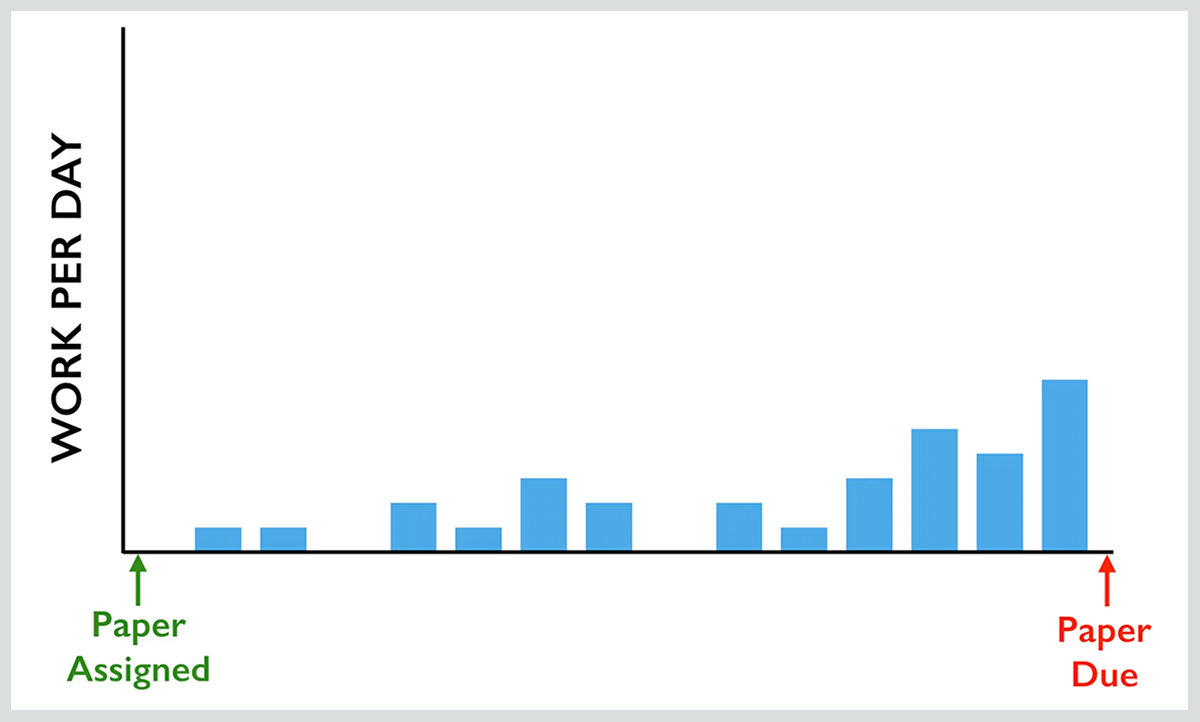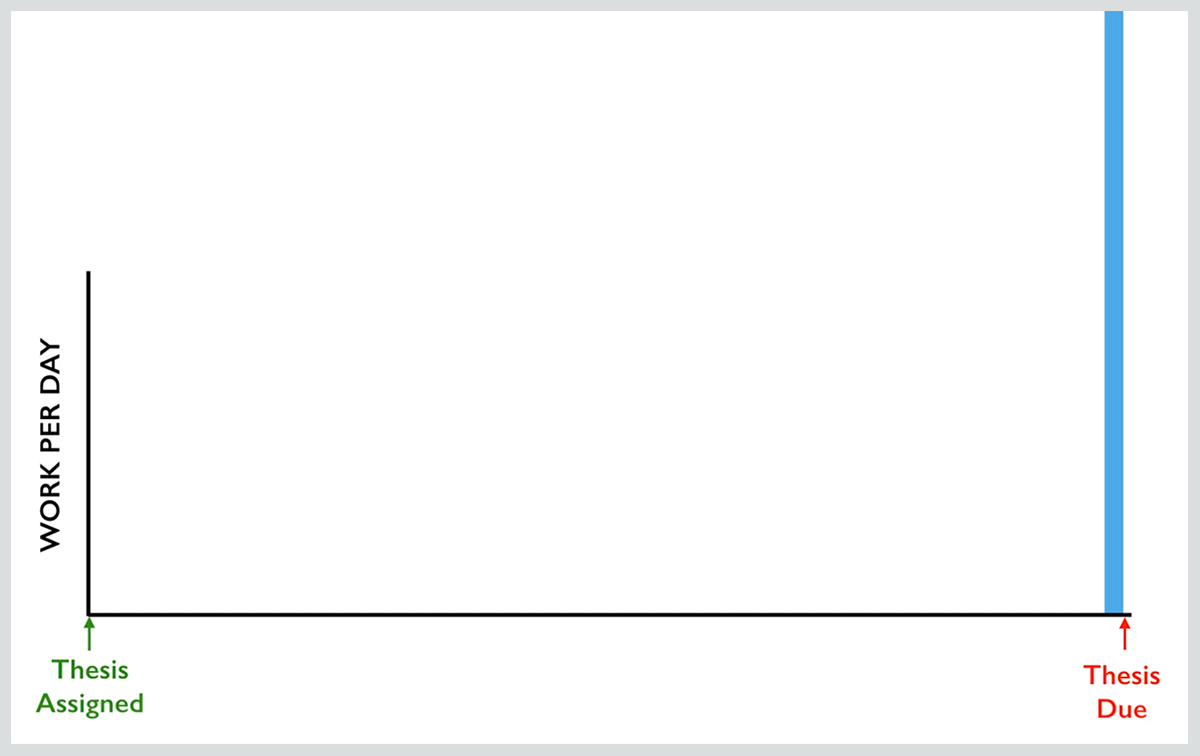
Alrighty folks, this is an 8-minute read. Letting you know because if you’re in the midst of finals week, every minute counts.
Though maybe you’re reading this article to procrastinate further. If so, at least you’re procrastinating by learning USEFUL information, like the best study methods. So…well done?
In a perfect world, you’d be preparing for finals all semester long.
Your target study schedule might look similar to author Tim Urban’s original goal for his thesis:
Unfortunately for Tim, procrastination got the best of him and his thesis prep and writing eventually devolved into this (a measly 3 days 😵💫):
Oops.
If you haven’t seen Tim’s famous Ted Talk on procrastination, it’s well worth the watch.
Not now. Focus.
Close your 26 open Chrome tabs, silence your phone, and get yourself somewhere distraction-free. There’s NO TIME, so let’s get to it—here are the best study methods (whether you’re right on track or playing catch-up).
1. Apply the 2-minute rule to break procrastination
You know that feeling when a task looms so large it becomes mythical? Like your bio lecture slides are now a fire-breathing dragon that you’ll avoid at any cost?
Get around this by using the 2-minute rule.
This tactic, popularized by author James Clear, is beautifully simple:
If something feels overwhelming, just do two minutes of it.
That’s it. Two minutes. Not an hour. Not until your eyes bleed. Just enough to trick your brain into getting started. And once you’ve started, you’re way more likely to keep going.
Still skeptical? Try this:
Instead of “I need to study for five hours,” tell yourself:
“I’m just going to open my laptop and review the first two slides.”
Or: “I’ll write one sentence of this essay. Just one.”
Nine times out of 10, two minutes turns into 20 once you get past the most challenging part—starting. You get into the zone, and suddenly you’re… actually doing the thing.
Small starts > no start at all.
2. Embrace the power of “body doubling”
This study method is another great one if you struggle with procrastination (so… basically everyone during finals week).
Body doubling is exactly what it sounds like: having another person physically or virtually “there” with you while you work.
You don’t even have to be working on the same thing—as long as someone else is nearby doing their own task, it helps your brain snap into “okay, it’s focus time” mode.
This can be helpful for getting started. Or staying engaged. Or not spiraling into a TikTok hole.
Research suggests that this approach (originally popularized in ADHD communities) works by giving your brain external structure and subtle accountability.
Sometimes, not being alone in the grind makes all the difference.
3. Use active recall and spaced repetition
Let’s be honest: rereading your notes for the fifth time isn’t the most helpful study strategy.
If you actually want to remember stuff, you need to pull it out of your brain, not just shove it in over and over.
That’s where active recall and spaced repetition come in. Let’s call them the power couple of productivity—each strong on their own, but next-level when paired up.
Active recall means quizzing yourself—trying to retrieve information from memory without looking.
Spaced repetition means reviewing that info again later, at spaced-out intervals, before you forget it completely.
These techniques work because they force your brain to do the heavy lifting—which is exactly what helps cement the info for the long haul.
@workingstudentlife Number 3 is a personal fav 🤭 full guide to the best study methods can be found at the 🔗 in bio! #thevectorimpact #collegelife #collegestudent #workingstudent #studytok ♬ original sound – 𝓶𝓪𝓷𝓷𝔂 😻
In their book “Make It Stick,” researchers Peter Brown, Henry Roediger, and Mark McDaniel confirm this idea—that struggle and effort during studying (a.k.a. making your brain actually work)—leads to better retention. It’s backed up by cognitive science, including this study that shows active recall and spacing outperform cramming and rereading.
Bonus: This method helps you feel way more confident walking into the test because your brain’s already used to pulling the info out on demand.
4. Try the catch-up quick method
We’ve all got that one class. The one you swore you’d “circle back to” after spring break… and then never did.
The good news is you don’t need to read every word of every chapter to pass. Enter: the catch-up quick method.
Why this works: Instead of drowning in every detail, you’re prioritizing high-impact content—the stuff most likely to show up on the test. This kind of focused attention helps reduce overload and boosts memory retention, according to Cognitive Load Theory. Next up: A not-so-secret weapon that will help you not only catch up quick but quite possibly speedrun through finals… At this point in the semester, your brain may feel like it’s running on fumes and instant ramen. Grab your caffeinated beverage of choice and lean into your digital native identity because we’re about to make the most of the bots. If you’re not using AI to study in 2025, what are you even doing? IT IS SO HELPFUL. And I’m not talking about helpful in a “write my paper for me” kind of way, but in a “make studying suck less and work better” kind of way. It takes what feels overwhelming and breaks it into something manageable. Here’s how to use it like a pro: 1. Turn your notes into practice questions If you’re just staring at a Google Doc and hoping the info magically soaks in—try this instead. Copy and paste your notes into ChatGPT and ask: “Can you make 10 multiple choice questions from this?” Or: “Quiz me with short answer questions based on this content.” Even better, ask it to explain the answers afterward so you’re reinforcing what you get right and learning from what you miss. 2. Summarize long readings (because who has time?) Got a 40-page PDF you haven’t opened yet? Feed it to ChatGPT and ask for a one-paragraph summary or a list of key takeaways. You can even say: “Explain this like I’m 12.” No shame. It’s all about getting to one thing—comprehension. 3. Create a customized study plan Feeling lost in a sea of exams, deadlines, and passive-aggressive Canvas notifications? Ask: “I have four finals over the next 10 days. One is cumulative, one’s multiple choice, and I haven’t started studying. [Enter specific details of each class/final. Ask AI to ask YOU any questions for clarity. Remember: The more detailed and specific your prompt, the better the output.] Make me a study plan.” Your AI chat can lay it out by subject, by day, and even throw in review sessions. 4. Use it as a virtual study buddy If you’ve ever sat in front of a confusing formula and thought, I’m too embarrassed to ask this again—AI is your new best friend. You can literally say: “I don’t understand this. Explain it like you’re my tutor.” Or: “Walk me through this step-by-step with an example.” AI won’t do the work for you, but it will help you work faster, smarter, and with way fewer meltdowns. [Disclaimer: AI is a tool. It’s come a long way, but it’s far from perfect. Use your best judgment and seek out human support when needed.] Trying to power through hours of studying without a break is like expecting your phone to last all day without charging—it’s not gonna happen. In fact, studies reveal that intentional breaks (from 5–60 minutes) help to “increase your energy, productivity, and ability to focus.” Even a brief, one-minute pause—if it meets the standards of a quality break—can boost your focus and efficiency. The key is to be mindful of how you’re using your breaks. Scrolling through social media might not give your brain the rest it needs. The right breaks will help you make the most of your study time. For more tips on balancing time management, focus, and self care, check out these resources: At the end of the day, there’s no one-size-fits-all formula for finals week success. Some people thrive on color-coded flashcards and study playlists. Others need to pace around their room, explaining the Krebs cycle to their dog. What matters most is that you find strategies that help you focus, retain information, and stay (mostly) sane during a notoriously chaotic time. Whether you’ve been logging study hours day and night, or you’ve just realized your econ final is cumulative—there’s still time to finish strong. Start small. Mix in different study methods. Take breaks on purpose. And don’t be afraid to experiment a little to see what sticks. Finals week will never be fun, but with the right approach, it can be a lot less painful. Remember, no one gets a medal for suffering in silence and isolation. Grab a friend, take that walk, use AI tools, and give yourself permission to rest when you need to. The end is in sight—let’s gooooo!
5. Leverage AI as the ultimate study method
6. Take planned breaks (to rest and de-stress)
The best study methods? The ones that work for you














